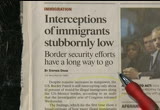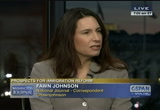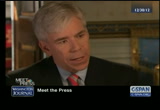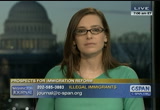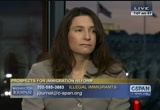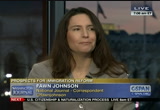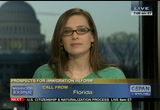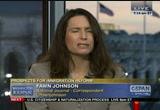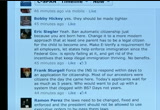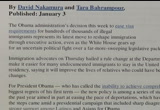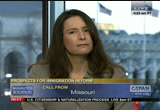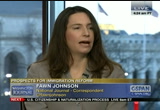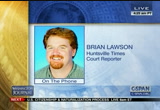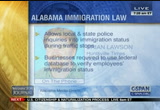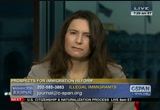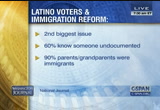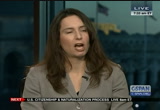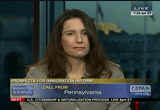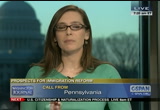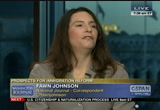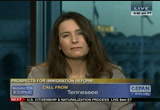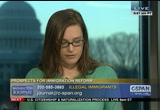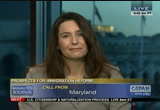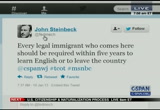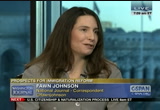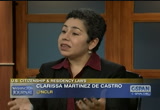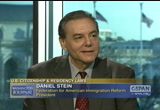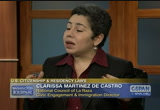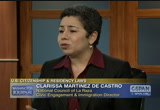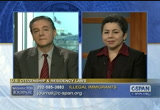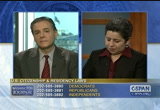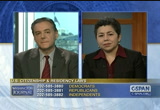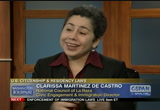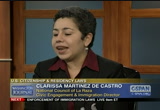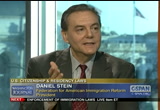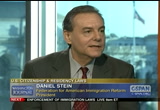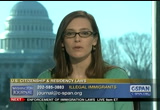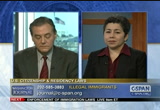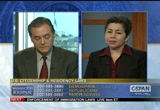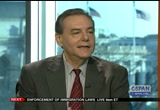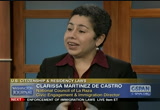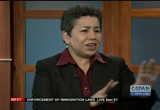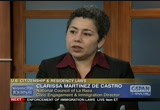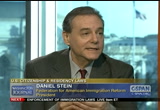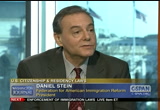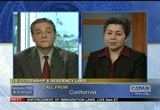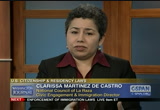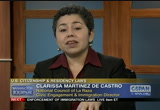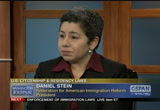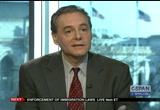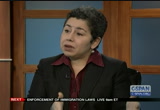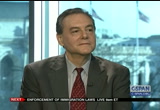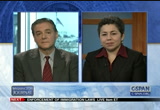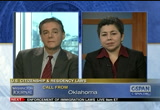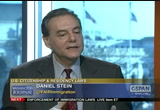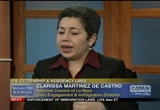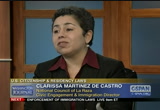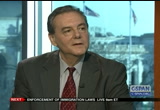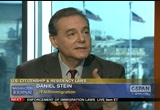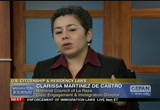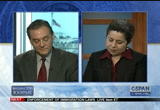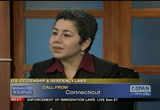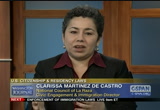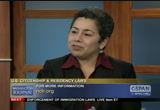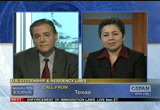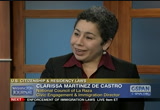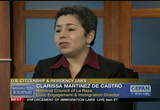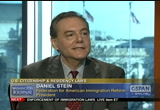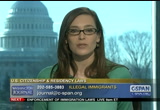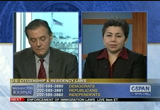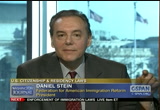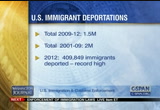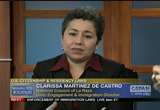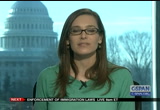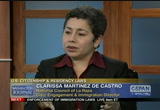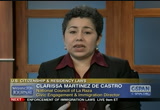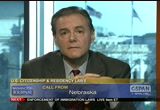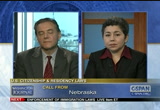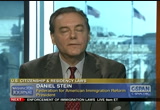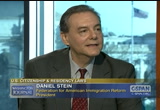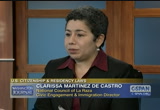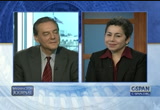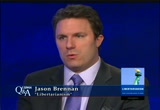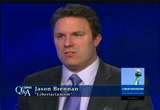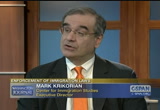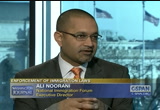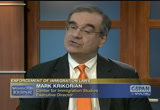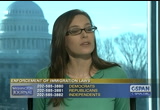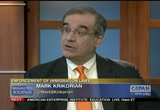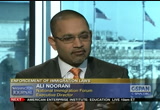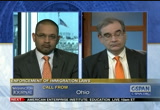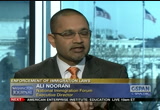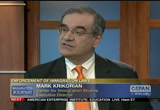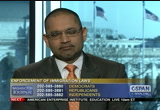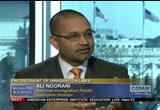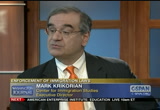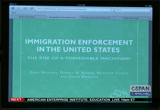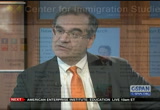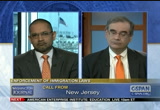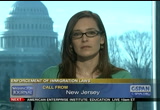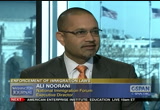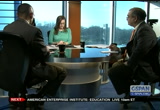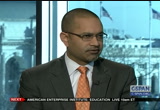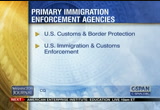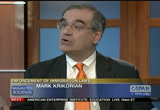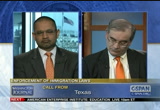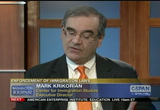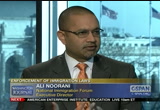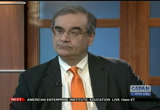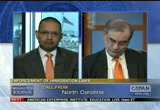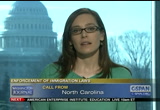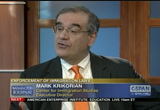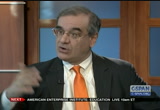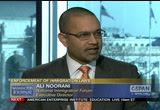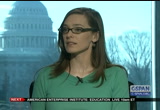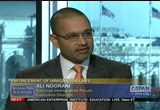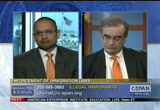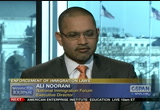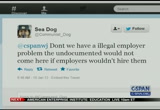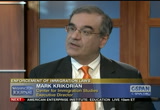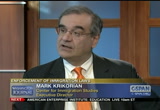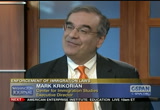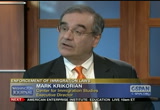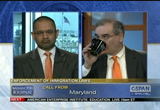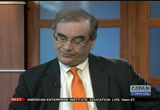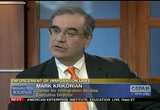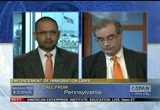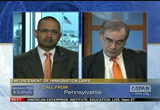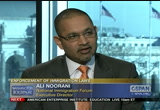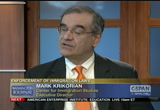tv Washington Journal CSPAN January 10, 2013 7:00am-10:00am EST
7:00 am
on u.s. assists. and a discussion on immigration enforcement. host: good morning and welcome to "washington journal" on this thursday, january 10, 2013. in the news today, president obama sees more cabinet changes. he's expected to name advisor jacob lew to the position of treasury secretary and labor secretary hilda solis has announced her plans to resign. the vice president continues meetings today on gun issues with hunters and gun owners, including the n.r.a. yesterday he sat down with advocates of gun control. we're focusing the "washington journal" this morning on the issue of immigration, its policies and politics, and we'll start by asking you what changes, if any, you'd like to
7:01 am
see in immigration law. here are the numbers to call. democrats, 202-585-3880. republicans, 202-585-3881. and independent callers, 202-585-3882. we also have a live set up for illegal immigrants. they can call us at 202-585-3883. we're also online. you can join the conversation on social media. accepted us a tweet by writing, @cspanwj. or chime in on facebook. look for c-span to weigh in there. we also take emails, journal @c-span.org. interceptions of immigrants stubborning low, border security efforts have a long way to go. it says --
7:02 am
host: from the "new york times," we also see a piece this week looking at a new study on enforcement and the money spent enforcing immigration laws. it says a new report sets the stage for a debate on immigration overhaul, huge amounts of money spent on immigration. joining us this morning to get our conversation started is off and on johnson of national journal. she's a washington, d.c., correspondent who covers immigration among a variety of other topics. thanks for being here. guest: pleasure. host: are there prospects for immigration reform, changes to the law in 2013? guest: sure. i think that this is the first breath of activity that we've seen in about six years. the president has named it as his top priority, and he has not backed away from that, despite the fact that some of the fiscal cliff problems that we saw at the end of last year still haven't been resolved.
7:03 am
and all indications that i have from anybody who knows about it is that the talks are going forward. now, whether or not anything is actually going to happen in the end is still something that remains to be seen. it's as tough as it was in 2006, 2007, when we last debated this. host: you mentioned the words fiscal cliff. we saw the debate over budget issues unfold around the new year. it's not over yet. is that conversation done? at what point can the white house and congress move on to something else? guest: well, i'm guessing -- and this is just me observing -- the conversation probably isn't going to be done until the next election or until something else changes. this is something that clearly, particularly republicans in the house really want to push. they're going to use every opportunity that they can. we managed to get some of the tax issues taken off the table at the end of last year. that was difficult for a lot of us to watch. but there's still some questions about spending. that's going to come up in the next couple of months. there's appropriations to be done. i imagine that conversation
7:04 am
will keep on going. and i was very worried after i first came back to work after the break, because i said, well, what is this going to do for the immigration agenda? having covered this in the past, i know how much energy it takes from members. but i don't think that the members who are going to be the most involved in the fiscal cliff spending kinds of discussions are the same ones who are going to be pushing on immigration. and as long as you have someone in the senate, like majority leader harry reid, who also wants to move forward, i think you're still going to see some action. host: let's hear what president obama had to say. this is when he was on "meet the press" right before the new year, him talking to david gregory. >> i'm asking about time frame, as you well know, your second-term president, even having one re-election, your capital is limited. what is your single priority of the second term? what is the equivalent to healthcare? >> well, there are a couple of things that we need to get done. i've said that fixing our broken i will great system is a top priority -- our broken
7:05 am
immigration system is a top priority. i will introduce legislation to get that done. we've talked about it long enough. we know how we can fix it. we can do it in a comprehensive way that the american people support. that's something we should get done. host: president obama on nbc december 30. how much of that, off and on -- fawn johnson, do you hear as a response to the election? guest: well, it's largely a response to the election, but keep in mind that the president made this particular priority before the election, which it's hard to say exactly what drove that. but one of the things that has been very clear throughout his first term is that the latinos who helped him get elected in 2008 were very upset that not very much happened over the course of obama's first term. he was very focused on healthcare. and i think the president genuinely wants to deal with this issue. everybody who has been involved in it knows how difficult it is. he just wasn't able to put the energy into it he did in the
7:06 am
last term. once the election happened, it became clear to republicans that they couldn't just say no like they had been doing over the last four, five years, because the hispanic population only voted for obama. that kind of sets up a much more friendly environment to talk about the issues. host: fawn johnson, correspondent with national journal, we're focusing the "washington journal" this morning on issues surrounding immigration. later on, we'll talk to some reporters as well as folks on both sides of the issue right here on n washington, d.c. our first phone call is from ryan in texas on our democrats line. hi, ryan. caller: yes, how you doing? host: good. caller: i would like to say, they're not going to enforce the immigration laws. some of the people that i know out with these charges, that they're not going to follow immigration rules, just some of these guys that got these crack
7:07 am
charges and trying to get back to their families. host: you're talking about drug charges? ok. let's go to trevor in arlington, virginia, on our independent line. hi, trevor. caller: hello. how you doing? host: good morning. caller: basically the premise of my question is, you know, everybody involved in deciding what's going to happen with immigration, you would think they would have to be thinking, how much more revenue can we get if we do legalize the 13 million or whatever undocumented workers? i mean, that has to be an upside. and also, how it's related to the war on drugs, you know, affecting where they come from and how violent it is, and really pushing them north. it really is all interrelated, and mainly, i would say you would have to think there's an upside to gaining the extra revenue. that's it. host: thanks for your call. fawn johnson? guest: i agree. that's an interesting point, especially when we're talking about spending. i haven't seen the full debate yet about the costs versus the
7:08 am
advantages or the fiscal advantages of having more legal immigrants inside the country. keep in mind that a lot of them are already here, and whatever they wind up doing is probably not going to increase the flow of immigration that much. since 2008, the recession, there's not been as many people wanting to come here just because there aren't as many jobs. it is true, however, that if you are able to come up with some sort of legal status for all of the people who are undocumented, that you would get a greater tax revenue. most of the proposals i think obama would also endorse, would not make them eligible for the kind of benefits that are very costly for things like healthcare and medicaid and stuff like that. they would be in the schools that i believe they railroad will, so i don't think that's a huge change. i think you're going to have people who are going to talk a lot more about that. host: here are some numbers that the cato institute developed, how overhauling immigration law might alter the economy.
7:09 am
we see the cost of mass deportation. they estimate that to be $2.6 trillion. temporary worker program, they see it as a benefit to the u.s. economy of nearly $800 billion. and then comprehensive revisions to immigration law, $1.5 trillion. they say that would entail giving unauthorized immigrants a pathway to permanent legal status and citizenship, also open the boreder to new immigrants who would have full labor rights so. one snapshot of that financial picture. well's up next, joining us from florida on our democrats line. what part of florida are you from? turn down your tv for us and go ahead. caller: ok. yes, first of all, good morning, everybody. we're all immigrants. we come from other countries. and we all have to learn to get along, you know? so i say let's go here and let's get this reform, a
7:10 am
situation, then go on the table , and let's get it worked out from and get these jobs back so we can get all our jobs in this country, a great country. host: william, what would reform mean to you? what would immigration, your version of immigration reform, look like? caller: what it would mean to me? host: what would you do? what would you change? caller: not be -- not be like -- like putting fences up and all these deportation and stuff. everybody come to the country because it is a great country. and my view of it is what it has been since 1960.
7:11 am
you know, come to america, something that's great. it should be that same way. we should all feel that same way. if they don't go to other countries to be sold back, we should have our business here for everybody to come, give their part, and share in making it a better country. host: ok. william is a democratic caller. let's listen to what house speaker john boehner had to see. this is after the election, speaker boehner speaking from the capitol. >> i want to go back to your comments about immigration reform. when you said comprehensive immigration reform, are you endorsing a pathway to citizenship? >> well, i'm not talking about 3,000. what i'm talking about is a common-sense, step-by-step approach to secure our borders, allow us to enforce the laws, and fix a broken immigration system. but again, on an issue this
7:12 am
big, the president has to lead. i think members on both sides of the aisle want to resolve this issue. the president's going to have to lead here. >> are you endorsing a pathway to citizenship? >> i'm not going get into any of the details of how you would get there. it's just time to get the job done. host: house speaker boehner has called for comprehensive immigration reform changes to the law. does it look like what the white house would want? >> you saw from that clip that he was really not specific about what he wanted. i have heard from his aides also that they really want the president to lead. the big question that i have is , what happens if the president leads? we have seen what the house republicans do when the president leads. they usually just reject it out of hand. the people that i talked to who are involved in immigration in the house tend to want to do something that's a little less ambitious than what the president is talking about doing. they want to have little different parts of the law go
7:13 am
through committee and pass the house on their own. you've seen in the house the unwillingness to look at any legislation, and they have a hard time as we saw with the fiscal cliff getting those on the republican side. i don't think it's going to look anything like what happens with the president. the other question is, nobody is expecting the house to act on this until the senate does something. the senate will probably do something that's much broader and will encompass all aspects of immigration. host: here are comments coming from twitter. joe writes, we do have to address the problem with immigration and the welfare state, but i think that's easier than securing the borders. with another perspective, fred says, no reform until the border is secure. secure the border before passing any more laws, please. guest: yeah. those are actually probably the best perspectives that you can have on this debate. one of the things that i found interesting is that the question about border security is starting to get a little more sophisticated than it was
7:14 am
back several years ago when this was first being debated. the administration has put tons of resources into enforcement to the extent that a lot of advocates, particularly civil rights advocates, are actually very angry about it. it's never going to be perfect. i think that that's the place where the last comment that you read comes forward. we still have people who do constantly believe that a lot of them are criminals, drugging drugs or people. nobody wants that. so the question is, how much more needs to happen on the border and inside the united states before other kinds of reforms can happen? i believe that what the administration has been trying to say for the last two years is we've done that. look at the number of people we deported, something like 400,000 people, which is more than any president ever has in the last, you know, in all of history. the border is looking much better. i've been down, i've looked at it, it's looking better, but there are still problems. the question is, is it ok?
7:15 am
that's going to be -- there's going to be competing versions of that no matter what happens. host: here are some of those numbers. on u.s. immigrant deportations, you can see the total so far during the obama administration, 1.5 million. for the entirity of the bush administration, two terms in office, we saw about two million deportations. and then in 2012 alone, nearly -- more than, rather, 400,000 immigrants deported, which is a record high. our next phone call is from mark in new jersey, republican. hi, mark. caller: good morning. i'm also a municipal chair here for the republican committee. i'm also going to be running for the state republican committee. i think the idea given immigration reform is absurd. we look at all the construction work there's these people have devalued over the years. who compensates them? we talk about equality and everything else and helping people. these illegal immigrants have destroyed more african-american communities because of the lack of jabs being taken by these
7:16 am
people. they're devaluing our weages. you look at the drug problems that are across the country that these people are transporting, and then you want to give them amnesty and make them legal citizens? they've criminals. they've destroyed millions of americans. you got 40 million americans on food stamps. another over 20 million that are underemployed or unemployed. give me a break. i mean, it's the american people. host: what do you think about tightening the law? would you make changes to the law? caller: i think employers that hire them need to be fined, put in jail. i mean, you look at the costs to our healthcare and everything else, these people aren't held accountable. my wife just had a baby. obamacare wouldn't do for me, i still have to pay the cobra. there's no help for working people. host: let's get a response from fawn johnson. mark was talking about how he'd like to see verifying and businesses held accountable.
7:17 am
guest: he's absolutely right. this is one of the big republican points, and this is something that the previous chairman of the house judiciary committee who is quite conservative and also quite conservative on immigration tried to get passed in the house in the last congress, and he did not succeed. just for the caller, e-verify is essential an electronic database where employers who, when they hire someone, can look to make sure that that particular person is legally in the united states. it's not a perfect system, but essential what will it does is just match their names and social security or whatever their tax i.d. number is and say they are legally authorized to work. it's something that employers are a little nervous about, because the system had some glitches earlier. it's a voluntary system now. but i think that it's been improved significantly, and it is something that will be part of a broader immigration conversation no matter what. the only question is, do you want to institute that first and then see what happens? there are some states that have done that. it's been a nightmare for some of them, because i think, on
7:18 am
the flip side of what the caller was saying, there are industries, particularly the agriculture industry that really rely on immigrant labor. and if they can't get those employees because they have to make sure that they're authorized, then their crops go unpicked, and that can be a problem also. host: fawn johnson is correspondent for national journal. we're talking about immigration. we started our show this morning by asking what you changes, if any, you'd like to see in immigration law. would you like to see the laws made more friendly for immigrants? would you like to see them made tighter? you can give us a call on our usual democratic, republican, and independent lines. we also have a line set up for illegal immigrants, and that number is 202-585-3883. we have a conversation going on on facebook. bobby says yes, the laws should be made tighter. we hear from eric who says, yes, ought -- yes, ban automatic citizenship. change it for at least one parent needs to be a legal
7:19 am
citizen for the child to be one. one says, force i.n.s. to respond within days to an application for citizenship. most of our ancestors were citizens the day they came here, and today's applicants wait for as many as five years. fawn johnson, our facebookers bring up a range of issues. what's the administration doing in terms of visas and the application process for a green card or citizenship? guest: well, they're doing what they can. there has been a backlog, and this goes back a decade or so, of people waiting in line to get their green cards, and then it takes five years after you get your green card to apply for citizenship. as i understand it, they have actually resolved the backlog issue. they've put a lot of money into the aadjudication process. the issues are a little more complicated because there's only so much the administration can do to make that process easier. they can put money towards the adjudications. they can help the people who
7:20 am
are -- they can make the application process easier. but the organization that does this is self-funded, which means any applications have to be paid for by the people who apply. the rest of the changes that would take place that would make things work better are all part of a congressional decision. a lot of that has to do with the numbers. there's a hard cap on the amount of green cards you can get per year. there are different categories for them. but once you hit that cap, then the rest of the applications just pile up, and there's nothing they can do about that without congress acting. host: "the washington post" says the obama administration's decision, the first week of january to ease visa requirements for hundreds of thousands of illegal immigrants represents its latest move to reshape legislation action. host: it goes on to explain this latest policy change is focused on illegal parents who
7:21 am
have a spouse or child with citizenship. guest: it's actually a pretty small change to how the system works. this is the kind of thing that immigration lawyers have been asking the administration to do for several years, because they say that people -- the more people who are undoment, but would actually be eligible to be citizens won't come forward because they're afraid they're going to have to legal the country and be gone for several years before they can come back. this allows the people to apply for a waiver saying it would be a hardship to be separated from my child for three years, for example. i would like to have that waiver processed in the united states. and i think that will help a lot of people. i think it's a common-sense change. it's not a sweeping change. it's more of a tweak is the way i would describe it. but people really wanted them to do that. and these are the small things the administration can do by itself without the help of congress. obviously the biggest example
7:22 am
of that is the defered deportation or defered action program that the administration announced last july that allows the so-called dream act students, undocumented students who were brought here by their parents to apply for some sort of -- it's essentially a waiver, to say you can stay in the country. host: cindy tweets in, she's dubious anything will happen in the short term. she says the next six months will be all about the money, budget, debt ceiling, tax reform. immigration is last. let's go to james in missouri on our independent line. hi, james. caller: hi. i'm talking from personal experience. whenever i was working down in mississippi, this was the governor before haley barbour. i was painting on his house. he had about seven or eight illegal immigrants. i know they were, because he had one guy that knew how to speak english, and he had one guy that knew english and
7:23 am
spanish both. he told those guys what to do. the next governor is saying you're doing a wonderful job and everything is working and stuff. he knew that they were illegal. so, in other words, if you got the politicians that already know they're illegal, even let them come in their own backyard and work, i put my brush down. i could not work any more for the man, i'm sorry. but he knew who they were and what they were doing, and the company that they were working for, you know, it was a big company that was running this tree service and stuff. they knew what they were doing. it's corrupt and put a lot of people out of work in america. and that's what happened to a lot of people. host: thanks for sharing your perspective and story. fawn johnson, any response to that? guest: yeah, i think the thing -- i was on the phone with an advocate actually for the restaurant industry a couple of
7:24 am
weeks ago, and i was asking about the use of undocumented labor in kitchens and hotels and things like that. i think the caller mentions the act culture industry, the landscaping business is also heavily populated, i think we all know just from personal experience, with undocument labor. but the problem is people don't talk about that. particularly if you're running a small business, this is what she said to me, everybody uses undocumented labor, everybody. they're not going say it, because if they say it to me or to you or somebody publicly, they know they know they're going to be prosecuted, when they know the guy just next door is doing exactly the same thing. it's disturbing to people, particularly who feel like they need to have those jobs themselves. it's also not entirely clear that all those jobs are the kind of jobs that most americans would want. i think that's a legitimate debate to have. but at the same time, it's one
7:25 am
of those facts that people all know are true and they just can't figure out how to fix it. host: we'll go to alabama. our last caller brought up some of the issues that they're talking about. we're joined by brian johnson from the "huntsville times," joining from us his state. thanks for being with us. give us a sense of what the alabama immigration law currently looks like. caller: good morning. let's see, the essence of the law is still being kicked around by the courts. the courts have found that alabama's pretty far-reaching law allows law enforcement to do immigration status checks during, you know, traffic stops and other law enforcement contact. it allowed the state to engage in some level of detention while they're determination immigration status. but a lot of what alabama sought to do related to schoolchildren or contract enforcement or harboring or
7:26 am
carrying your papers. all of those things have been blocked by the courts at this stage. host: and brian lawson, i'm looking at a "new york times" story that calls the law in your state, passed in spring of 201, is the boldest test combret of the doctrine of self-deportation, trying to make immigrants, give them incentive to leave the state, leave the country. how is it playing out? >> you know, it's sort of a low stage right now. i think when the law passed in the spring of 2011, there really was meaningful flight from the state by folks who were either worried about being deported or income contact with law enforcement or were related to somebody who was. the school provision in particular we saw in effect. school kids stopped going to school. it was for at least a period that stabilized by almost all accounts that the shakeup is still unfolding. host: tell us about legal challenges. where are those at?
7:27 am
caller: there's two major lawsuits, and both of those have deadlines upcoming for the state of alabama to decide what it wants to do next. i think it's next week, january 15, the lawsuit that was brought by the department of justice against the state, alabama has to decide by that date if it wants to appeal injunctions to the u.s. supreme court. a lawsuit brought by a group of 36 plaintiffs, including, you know, labor unions, civil rights groups, illegal immigrants themselves, family members of illegal immigrants, that lawsuit will -- let's see, alabama has until the end of february to decide if it wants to appeal injunctions on that case to the supreme court. host: what's the business community reaction been like in alabama? how are they feeling the laws play out? caller: you know, that's a great question, and i'm not sure there's one answer on it. when the exodus occurred in 2011, particularly the
7:28 am
agriculture community was immediately impacted. i think those stories were widely reported. you know, crops dying on the vine. they couldn't find enough workers, that sort of thing. i think the last summer, those folks made other arrangements. there are labor recruiting services. there's an ability to advertise to bring workers in. i think that worked better, but i don't know that farmers were especially happy that way either. poultry is a huge industry in alabama, poultry production, and those folks have had mixed results i think in terms of recruiting from what we've seen. i don't want to pain too broad a brush, but i think in general the labor cost them a little more, too. at the same time, you know, the larger business interests have pushed hard to have some of the penalties that were contained in the original law scaled back. some of that's occurred. so you're not seeing an outcry from any sector maybe other than agriculture, and that's a little muted compared to where
7:29 am
it was a year and a half ago. host: thank you so much for joining us. that's brian lawson, a court reporter at the "huntsville times," talking to us from alabama. thank you for joining us. let's go now to our next phone call. we're talking this morning about what you think of immigration issues. we're asking you, during this hour, if you think the laws should be loosened, tightened, changed, or do you want to see them enforced in a different manner? steve is in las vegas, democrats line. hi, steve. caller: hi, good morning. the issue is, this could have been taken care of 30, 40, 50 years ago. i'm you need to do in this country was be genuinely be sincere about resolving the issue. all they need to do is speak to the native born mexican americans about the issues with the illegal -- the mexicans americans have been staunch, completely against foreign-born, illegal mexicans coming in here, taking the jobs, completely disrespecting
7:30 am
the native-born mexican americans. never in any issue have they mentioned the mexican americans to c-span or fox or cnn. nobody talks about the mexican americans about how they feel about the foreign-born, illegal mexicans that are coming here disrespecting the employers in this country, go off the carpet for the foreign-born mexicans, and it's completely disrespect to mexican americans. host: steve, are you a mexican american? caller: yes, i am. i'm 5 years old. host: thanks for your call. let's look at some stats that we saw surface from national journal, fawn johnson's publication. during the election we saw that latino voter felt that immigration reform was the second biggest issue to them. 60% know someone undocumented. 90% had parents or grandparents who were immigrants. guest: i'm very interested in
7:31 am
hearing that caller, because honestly this is the first time that i have heard that from anybody of any latino heritage at all. almost everybody that i meet who are citizens, and there are a lot of them that have some mexican american background, are very much in favor of doing something very broad on immigration. and i think i've heard a lot of them say that they know somebody who's undoment or could be helped by this. i mean, i'm interested to hear that perspective from other people, because i think of anything i've heard from the community of latinos, and i have to use more latinos more broadly, but i think a lot of them are mexican americans, some of them are more frustrated that because of the immigration issue has dominated their own community so much is that they all tend to lean more democratic, and i think a lot of them would actually become -- they would vote more republican and they are more conservative than they feel they would be otherwise. it's interesting to hear -- ask
7:32 am
immigration, you'd actually see more of a 50-50 split between republicans and democrats among the latino community. host: what are we hearing from emerging voices in the republican party on immigration? who are the leaders of 2013? in the republican party, we're trying to capitalize on that opportunity. guest: right. well, we have some old -- old is not the right word. we have familiar faces who are going to be involved in the immigration debate. senator john mccain from arizona, he disappeared from the issue a little bit so he could run for president. he's back. he's part of some of the negotiations that they're having. we also have senator jeff blake, the new senator from arizona, who has been involved on the issue for a long time. he actually sponsored a bill with a noted liberal, an immigration advocate, louis gutierrez, back when he was in the house. then we have new people. marco rubio, senator from florida, obviously a presidential hopeful, has been involved in the issue. a lot behalf he has to say is
7:33 am
about the tone that republicans take. i don't think he's going to be involved in the nuts and bolts, because it's partly because of his presidential ambitions. but he's tried to come up with a middle-ground way, maybe not amnesty, but some sort of legalization, not citizenship. it's not clear how it would work. he speaks very eloquently about this. we'll have to see how that plays out. then there are new people. there's the senator from texas, newly elect senator. he's very conservative. and in order to actually move something through the congress, you're going to need people like him signing off on it. so i'll be interested to hear what he has to say. we already have senator mike lee from utah. he's a tea party favorite, although he's very smart and he's hugely constitutional -- that's his whole shtick, adhering strictly to the constitution. he's on what they call a gang of eight in the senate. the gang of eight will be
7:34 am
trying to figure out a bipartisan solution. i think you have to wait a little bit to see what's going to happen in the house. there is a new chairman of the judiciary committee, and he is -- he's been around for a long time he's pretty conservative on the issue. my guess is he's going to look more at enforcement. host: fawn johnson, correspondent for national journal. let's hear from jay in pennsylvania, republican line. hi, jay. caller: hi. i have a couple of things to say. i've called before. this is important. we always frame this in economic terms and never cultural. i grew up -- here in sellersville, a town that i just got back from north dakota. i'm a blond-haired, blue-eyed migrant worker. i left this town because there was really nothing left. i called and i talked to c-span's you'd convince about three months ago. i went out there for the sugar bee harvest. i also had a good job, and i've come back for the winter. i'm going back in a few months. out there, somehow, they get things done with a population that's about 99% white, mostly
7:35 am
german and norwegian. all the people that wash dishes, and most of the people that work in roofing are all white. same thing with my town. i was a roofer here 20 years ago. there wasn't a mexican for hundreds of miles. and somehow we got things built. somehow we framed houses. my friends were all plumbers and heating and cooling mechanics and we made very good money until they began to import wonderful diversity into our town, diverse thought most of the people look out from the window that you see in your air conditioned little offices. well, there are 10,000 towns like sellersville where there are people who work with their hands and they don't -- not everybody is a politician, not everybody is a pun did it or a journalist. they have to have these jobs. that's a little myth. now, i want to say one more thing -- host: before we move on to that. let's just check with you. there's certainly people who are americans who are not white. what you're talking about is a largely white workforce. are you ok with the diverse
7:36 am
workforce that's born in america? caller: of course. but let's back up a second, libby, here. we frame this economically and not culturally. we're made up of a assimilated groups that were melted down and made simple i grew up in a town where there was polish people, hungarian, german, italian. we didn't even know what we were. that's what we've forgotten n. our history, we always cut the apron strings of migration at a certain point. there are only six millian germans allowed to come here, only five million italians. in 196, woodrow wilson sent 5,000 troops under black jack to secure the southern border after the incursions into there -- it was not close to the violence today, or the illegal immigration today. whenever we had a down turn with a great depression, you halted migration because there were hundreds of thousands of americans in bread lines. host: we'll talk about the economy in just a moment. i want to share a tweet that's similar to what you're saying. bob says immigrants are welcome if they choose to become americans by getting required nationalization, becoming
7:37 am
citizens, speaking english, and paying taxes. there are too many that want to come here, work, and some of the money they make back to their country. jeff says on facebook, the existing laws just need to be enforced. that's all on our facebook page. look for c-span. we see a comment from gary on to witter who writes, it's time to address illegal immigration while the economy is in the dumps. hopefully the economy will improve. then the floodgates will reopen. fawn johnson, what correlation are we seeing between the economy and immigration? guest: well, that's an interesting comment you just read, because the last time that i saw a lot of action on immigration happening in the united states and inside the capital was when there was a huge economic boom. this was in the late 1990's, early 2000, part of the internet bubble. a lot of the action was actually happening on high-tech , high-skilled -- there were tech companies who are just screaming for them. it's hard to imagine, but they
7:38 am
actually raised the limit for those, the visas for high-tech, high-skilled workers to about 200,000 per year, which is unthinkable at this point. we're in a really different situation right now. because of it, we've actually had fewer illegal immigrants. wee got a lot less to deal with, in fact. i think the apprehensions at the border have dropped about something like 2/3. there are fewer people trying to come in. i was actually down there last year. the border agents were complaining about being bored. sometimes they just walk along the border and nothing's happening. that's what the economic down turn does. i think that your commenter might be right, though, that with a down economy, it gives people a chance to sort of step back and say, ok, what makes sense without having some sort of threat hanging over their heads that businesses are going
7:39 am
to close or that they need their workers? it's hard to say, because one of the things that republicans have repeatedly been saying throughout the last couple of years is that we can't even think about opening the gates to anybody until we get the employment situation up. it's a very effective argument, and it's really good at stopping things from happening. so we'll see. host: here had numbers from the pew research center. unauthorized immigrants in 2011, 11.1 million. it says there were 11.1 million unauthorized immigrants living in the u.s. back in march 2011, unchanged from previous two years, and the continuation of the sharp decline in the population since its peak in 2007. you can see there it's falling down slightly. and then also, from the pew research hispanic center, the net migration from mexico specifically falls to zero and perhaps less. you can see the change over time of that pattern of immigration.
7:40 am
one says, my second generation still don't speak english, giving a perspective different than our pennsylvania caller. let's go to jeff in knoxville, tennessee, on our independent line. hi, jeff. caller: good morning. how are you? host: good. caller: i'm about to agree very much with the guy from pennsylvania. you know, i've seen it start out like the lady was talking about with the illegals in lawn care. it leads from lawn care to the roofing to the painting to, you know, the restaurants. there is a lot of americans -- and i'm one of them. i have three children. my wife works, thank god. we're living on about less than -- by the time our insurance comes out of my wife's check, we're living on less than $300 a week. mortgage payment, car payment, insurance, you know, really, something needs to be done, but you cannot rely on washington. they are so dysfunctional.
7:41 am
instead of worrying about our own borders, we're in the middle east worrying about everybody else's. host: so, jeff, what would you change? what would you change? caller: well, what i would change, we would do something serious about border control. host: border control. caller: yes. host: ok. caller: you know, you have to stop the inflow of illegals. you have to. i know your statistics say that the number is down, but the jobs are not there. you know, i would very gladly work lawn care right now if i could find a job doing that. but everybody is afraid to kick an illegal out to put an american in. that's just the way i feel. host: we mentioned this story earlier, jeff, from "the washington times" today, talking about border security efforts. it says, new findings from the government accountability office show a broad estimate of
7:42 am
how many illegal immigrants border patrol fails to catch each year. hope our next caller is from maryland on our democrats line. good morning. caller: good morning. how are you? host: good, thanks. happy new year. caller: happy new year. c-span is one of my favorite programs. i want to know why is it -- we know immigrants are here. immigrants are here illegal. companies will hide them and put them to work. i know some of our young people are going out, but we need to start at the top and come to the bottom and work up.
7:43 am
i'm 3 years old. i used to have a licensed daycare for 22 years. i kept hispanic children who was here legal. i love them because i can't hate one and love the other. i have to love them all. i feel like we're not doing what we should do to bring this up to a standard where everybody can work. host: thanks for your call. one of our callers on twitter says, when an employer claims we cannot find workers, they neglect to add for what we want to pay. guest: i think that's -- i was interested in hearing the previous caller who was talking about how he would love to have a job in lawn care if he could just get one. i think one of the things that perhaps people have not -- there's not been as much attention paid to the internal enforcement of immigration in the united states, which is very different than border
7:44 am
security. we're talking about essentially enforcing employers who hire illegal labor. it's very difficult to do. it requires a lot of investigation. the obama administration has been under some criticism from some people who want more enforcement, who are changing the way that it enforces the internal aspect of immigration. essentially what the obama administration is doing is a mass audit of employers' i-9 forms, which is immigration forms, and looking for irrellities. when they find them, they start pushing a little bit further. it's very different from the bush administration, which they basically they just raided employers. they didn't do very many, but it really created a chilling effect, i guess you could say, on hiring illegal labor. it's not really clear exactly how thad that, but one of the things that we should remember is that all of those 11 million undocumented immigrants who we think are here, they came here a while ago. they can't leave. they're kind of stuck. and they all have jobs, or some
7:45 am
of them have jobs. it's unlike that will their employer will actually fire them unless they do bad work. and so, what do you do in that situation? the only thing you can do is try to force it through the current either audits or raids, and neither one of those work very well. host: how many c.p.a.'s who lost their job would go out in the fields and pick lettuce? she's also talking about the question of unemployment. steve is up next from corpus christi, texas. he's a republican. i'd like to remind all our listen there's we have a line for folks who are illegal immigrants. they can call in at 202-585-3883. go ahead, steve. caller: yeah, how you doing? i'm just kind of a frustrated republican here. i'm a first-generation hispanic, retired military guy. i got a college degree. did that while i was in the service, even on active duty. i mean, we actually created this system to get, i guess,
7:46 am
cheaper labor in good economic times. and when it becomes difficult, now all the sudden we look to immigration. you know, i'm wondering what in the world is going on here when we want these reduced costs? we have people who refuse to do this kind of work. we got americans who would rather get three years of unemployment rather than having to get out there and hustle. the gentleman that was complaining about the lawn care job, move to texas. there's plenty of jobs out here if you're willing to go to move to them. host: thanks, steve. guest: it was interesting to hear that comment. i've been interested in watching how texas particularly deals with this issue, because it's a little different from the rest of the country from what i can tell. you can just look at rick perry, who got skewered in the national polls for supporting some sort of college, you know, in-state tuition for undocumented immigrants. it seems to me that there's something going on in texas that i'm interested in seeing about what is conservative --
7:47 am
leak our caller, look, maybe we need to come up with something that's a little more rational. my guess is a lot of that has to do with texas is a border state, has been dealing with this. and like our caller said, they're a little more familiar with the issue. host: let's go to arizona. we're joined by a reporter from phoenix, from a public radio station there, jude joffe-block is with us. thanks for joining us have very early -- thanks for joining us so very early, jude. we saw the controversial law, sb-1070. remind us what that is, and where is that right now? we haven't heard too much about it in the last couple of months , nationwide. caller: sb-1070 was the state's immigration law t. included several provisions, sort of like the alabama law you heard about earlier. back in june, the supreme court struck down three provisions of the law that the federal government had challenged.
7:48 am
there's been a lot of interest in the one provision they did let go forward. a lot of people have called it the most contentious part of the law or the heart of the law or the show me your papers provision. it's the part that says law enforcement are required to check immigration status if they have a reasonable suspicion that a person is in the country illegally. but it wasn't until september that that provision has actually taken effect. so, it's really just been a few months here. it also doesn't mean that litigation is over, the law is being challenged. it's just that we do have that provision in effect for the last few months. host: are you getting a sense of how it's playing out, how law enforcement is dealing with it, how it's affecting illegal immigrants? caller: well, these stops are happening, and these questions about immigration status are happening on the ground. but what's interesting is that the federal government is going in totally the other direction from arizona on immigration
7:49 am
enforcement. so, there's been a few decisions that they've issued basically to convey that they're not interested in putting everyone who's arrested, who's undocumented, into deportation proceedings. so just two weeks ago, right before christmas, there was an even more informal move. previously swunl arrested by local police, no matter how minor that infraction, you know, it could be for driving without a license, if they were booked into jail, they were at risk for deportation because immigration officers could pick them up after their criminal case. but now officers are told there has to be a more serious crime. what this is doing, the federal government is saying that they're not necessarily interested in the immigration status of some of the people who are being stopped and arrested by local law enforcement or other criminal
7:50 am
offenses. it has the potential to kind of undermine some of the intent of sb-1070. host: here's a story from the fronteras desk. jude joffe-block is looking at this change. jude joffe-block, if the federal government says we're really interested in people who have committed serious misdemeanors, how does that actually play out? where's the connection between what the state wants to do versus what the feds care about? caller: that's really the interesting question right now. that's kind of what exactly, you know, is shaping out on the ground, because we don't quite know. this new policy has only benl in effect for two weeks. we still don't know, but that came from a directive. we still don't know what it will look like on the ground here. certainly i talked to a sheriff who's certainly a supporter of
7:51 am
the sb-1070 law and of doing local immigration enforcement, and he feels like this is the federal government trying to undermine the state's ability to enforce their own laws. other immigration rights advocates think this might be a positive development, the direction that ice is going in, but at the same time, it's a little too early to know exactly what it will look like. host: we're seeing a story in the "arizona republic" recently about convention center bookings. it says they're down by as much as 30% from 2009. the newspaper says the immigration law known as sb-1070 is one of several possible factors. explain that for us and how local businesses received the law. caller: back in 2010, there was kind of -- this was a national story that immigration -- that arizona had passed this immigration enforcement law. and so, there was -- there was a fair amount of backlash, and
7:52 am
there were efforts to boycott the state and national organizations that hold conventions sort of put arizona off of their list. and, you know, there's some debate here about how much the bookings and the convention centers going down are attributed to sb-1070 and arizona's reputation on immigration. but there are certainly those in the hospitality industry who feel like that is -- that is the reason, or at least a centing factor. i think some other similar cities that accident after the economic down turn, are seeing more of a recovery in their convention business, whereas here in phoenix, we're still seeing this downward cycle. now it makes sense given that a lot of these conventions are booked a couple of years in advance. you know, if a lot of organizations took this move back in 2010, we'll be seeing the effects of it for a couple of years to come. join jude joffe-block with kjzz
7:53 am
from phoenix, also with the fronteras desk. fawn johnson with national journal, what is the federal government learning for what's being done in states like arizona and alabama? guest: well, they are -- it's almost like a battle of wills, if you will. obviously the alabama law was modeled after sb-1070. the alabama law actually went a little bit further. they included, for example, provisions on schools. the administration got, i would argue, quite a bit of a win when they sued arizona over sb-1070, because even though they allowed that show me your papers provision to remain in force, the other provisions that they struck down were actual al lot more far-reaching and involved things like whether or not you could be in -- my gosh, i can't even remember it anymore, things about your status or whether you could be stopped. so i think the administration is learning where they can and can't go.
7:54 am
the place that the supreme court seems pretty clear that they want to keep in place is that local law enforcement should have some cooperative role with immigration enforcement, and that's why they allowed me that show me your papers thing to remain. and so, that's where they're going to continue with it. the ice provision that jude referred to a little bit earlier is just out for a couple of weeks, and this has been one of those ongoing, interesting debates to watch inside the administration. because essentially what happens is you'll have this directive, this guidance, if you will, from the director morton to say, ok, immigration enforcement agents, here's what you should be looking for when you're dealing with this. from what i can tell, i'm not really sure how much of a change it's going to change. the civil rights groups don't think it's going to make much of a change. they think all agents have way tooshpouf. but there is something to be said for saying, you know what, if you have an expired license plate, we're not going to put you in a detention facility for
7:55 am
five months. that doesn't make any sense. host: a tweet says, how about ending the war on drugs and stop selling guns to mexico? looking at the relationship between the u.s. and mexico in another light. felix is our next caller in oklahoma city on our independent line. hi, felix. caller: hello. good morning. how you doing today? host: good. caller: i'm a teacher here in oklahoma city. i teach a big hispanic population that oftentimes, many of my students were brought here by their parents when they were young. it really hurts me to see how many of them don't feel like they can fully incorporate themselves into the whole education process, because they don't have the ability to maximize all the education they're receiving because they can't go to college or they feel like they can't do this because they don't have a social security card or can't apply for financial aid. it seems like, i'm going to go to work in a few minutes, and a lot of my kids are going to
7:56 am
learn what i'm going to teach today and they won't feel like they can do anything with it. host: has it changed since the -- since president obama announced this defered deportation -- >> caller: i have a few -- a lot of the kids i teach aren't old enough yesterday to apply for the document. i teach middle school, but a lot of them are looking at the document as a way to get around that. but it's just the fact that, you know, we have people that i hear every day, and, you know, they were brought here -- everybody was brought here, you know what i mean? it just doesn't seem like we should be able to find a way to fully incorporate them. you know, just find a way to make them citizens just like and you myself and we can work to get that done. it seem like it's something that everybody should be able to agree upon, because it doesn't cost anything. it's a free -- it doesn't seem like it should cost anything to
7:57 am
say, all right, look, you've been here, you're doing the right thing, your parents brought you here, you're doing the right thing, and you're learning, you're making good grades, you're not in trouble. just go ahead and let you become a citizen. and then if they want to attach a fee to that, then that's what they can do. but it just seems like it's counterproductive for you to spend tax dollars on people that aren't going to be able to fully achieve the potential of what those tax dollars are going into. it's an investment issue to me and doesn't make sense. host: felix, have a good day at school today. he talked about doca, the defered program, the young people who came to the country. how are you seeing that played out? the application process has started. have we heard reports yet of how it's affecting people? guest: well, i haven't seen anything that's really damming. it looks like it's actually meant to be exactly what it
7:58 am
said it was. for the caller's purpose, one of the things that people are talking about, the advocates are looking for it, to encourage the administration to actually expand the program to siblings and parents who might be eligible dream act folks. for example, students might be the people they're talking about, people who are too young for the program. we had about 300,000 applications that have been filed. about 50,000 have been approved. very few problems that i have heard of. one interesting fact is apparently g.e.d. applications are going up in arizona because people who saw that they didn't need to graduate from high school, they're now realizing that perhaps they should get a g.e.d. host: john writes in on to witter and says every legal immigrants should be required within five years to learn english or leave the country. we have some comments on facebook. terry says, no, there shouldn't be different laws. the laws should be enforced. we need clear, constitutional leadership to enforce the laws
7:59 am
we have, protect our borders, and allow immigrants to immigrate in accordance of our law. and looking at one final tweet. just cut off the free evens. let people live their dream as long as they don't do harm. briefly, talk to us about entitlements and how they factor in. guest: that's a good question. i think one thing that people misunderstand is just what people who are immigrants in the united states are entitled to. they generally pay taxes if they have jobs. quite a few immigrants pay taxes now. but if there were more legal, they would pay taxes. they can go to school, and that is a benefit. but they're not entitled to things like medicare or to medicaid. the plays where you start to see the costs of things like hospitals, emergency rooms particularly for people who don't have their own private insurance have to go. other than that, there's not a ton of entitlements these people are allowed. and if they were to change the law, i think most people agree
8:00 am
they wouldn't be eligible for some of the really costly things like welfare. host: fawn johnson, correspondent with national journal, thanks so much for coming in this morning. guest: pleasure. host: fawn johnson helped us kick off our conversation on immigration. we're going to continue to focus on this topic throughout the "washington journal" this morning. coming up next, we'll hear from dan stein and clarissa martinez de castro. they will talk about illegal immigrants already in the country. we'll be right back. [video clip] >> q saw a lot of families --
8:01 am
the student was going to a music school. i wrote an article about a gardener who sent his son to college. the debt made about $21,000 a year. he was able to borrow six figures for his son. there was no underwriting. this lender settled with the new york attorneys general's office. it was called the preferred lender of lasist. lenders were accused of paying schools for preferential treatment and to steer students toward a particular loan product. that was the case with this lender. generation of students may feel
8:02 am
very duped and stuck with little relief at this point now that they are so far in debt. >> later today on c-span, the student debt crisis. that is fall live in a clock along with george mitchell -- that is at 8:00 later today on c-span. >> hollywood's most famous movie stars helping to sell war bonds. all part of a contingent of the celebrities giving their time and talents to aid the war e ffort. >> how popular culture presented the war.
8:03 am
how was it presented in comic books from the 1940's? how was it presented in athletic events and in tin pan alley from the 1940's? >> popular culture and world war ii with professor randy roberts, saturday night on c- span3. host: we continue our conversation with clarissa ro and danielastr stein, the president of federation for american immigration reform. thank you for being here. what happens if somebody is here illegally?
8:04 am
guest: right now 2/3 of the people have been here for over 10 years. the majority of them are in families where there is a u.s. citizen. right now it doesn't matter whether you have been here for 20 years, 10 years, one year. if you are found, you would be put in deportation proceedings. the obama has deported more people than any previous administration. there is a large population. it will not be automatic to deport everyone. we spent $18 billion and we think there is a better way.
8:05 am
guest: it is question of where you are and where you are detected and what the current policy is. in the end, what happens to an alien that is apprehended is different than what can happen to an alien that is picked up by local police for drunk driving. the question of whether there will be turned over for proceedings and an order to show cause and they may or may not be contained. there is a procedural process that can go on for a long time. how many levels of appeal he/she decides to pursue. there is virtually zero law
8:06 am
enforcement, no interior law enforcement at all unless you are a felon. or you are a terrorist. it is directed to state and local police not to detain or not to expect ice to detained aliens. only bad criminals. that's not what the law says. what reform means is fixing the problems we have today. host: focusing on the key word of reform. what would you like to see done? guest: recommendations that go
8:07 am
back 35 years. what is required to deter illegal immigration. the elimination of the family preferences that create a chain migration. other groups have their particular pet issue. you have to eliminate the chain migration system. would like to see those reforms and others. host: what does immigration reform look-alike to la raza? guest: congress seems to be a little behind teh ballothe balln
8:08 am
that. we need to restore the rule of law. creating channels that can get good with the law and have the responsibilities that we have here. you cannot restore the rule of law by simply doing enforcements. there are 11 million people living in our families and communities married to american citizens. preserving the rule of law. we have not fixed our legal immigration system in a way that responds to the economy. how much have you changed in 20 years let alone our economy? we need a system that is
8:09 am
elastic and respects the bedrock of family values. if we do those things, i think we can get out of this mess. host: we are talking about u.s. citizenship. our guests are clarissa martinez de castro and dan stein. our first caller is ellen from new york state. i am of the older generation. i remember senator kennedy said we have to fix immigration and i agreed with him. we were supposed to be given a way that employers would not be hiring illegal aliens.
8:10 am
my own senator put a loophole in there. nobody is using e-verify. i object -- every time a bill came up, like money that was given to construction work. an amendment was trying to be put in -- the contractors had to use e-verify to get jobs. it was cut down by the democratic party. rule is of people working in atomic plants. they wanted to use e-verify. the democrats cut that down.
8:11 am
they were doing in transportation. we spend all kinds of money trying to protect the airports. they wanted to use e-verify. democrats said they were not passing that because they were afraid of laza. our own citizens cannot get jobs because they are coming across the border and getting hired. they are not paying our taxes. some of the schools have cut a kindergarten classes because they are not getting in come from people working here legally. people of color are losing jobs . people coming across the border don't have to pay the wages.
8:12 am
host: you brought up a lot of issues. clarissa martinez de castro, let's start with e-verify. what do you think? guest: this show is set up with a republican line and a democrat line. immigration is a rare issue with those partisan lines are not separate. every time we have had an immigration debate, its success or failure has been at the hands of both democrats and republicans. there are conversations in the house and senate among republicans and democrats to try to fix it. a couple of things that the
8:13 am
caller was mentioning have been proposed and are happening. the program.use for somebody interested in seeing its become the law of the land and for other viewers, this is a system to verify the eligibility of workers to work. we need congress to pass legislation and to stipulate what happens to a worker with authorization to work that the system identifies wrongly. all of those things. but actually e-verify is happening. that is a frustration we see all over the place. we want to see a system that
8:14 am
makes sense, where immigration is legal, or people become citizens and are fully vested in the future of this country. that is what we want to see. if a politician is able to extract a deal, you end up with a patchwork. we want people to play by their rules. guest: it needs to be made mandatory. it was opposed by the administration. they wanted the freight of an unpopular amnesty bill attached to it. we have gotten promise after promise decade after decade that
8:15 am
we would have manageable flows and unmanageable numbers. the administration sued arizona and alabama. the idea that e-verify is still only voluntary is a national scandal. host: who should e-verify penalize? guest: businesses need to play a big role. they are part of the attractive magnet. they pressure congress just like the democratic constituencies pressure the democratic party not to enforce the law.
8:16 am
and unprecedented attack on all interior immigration law enforcement, opposing the enforcement provision of the jordan recommendation. 9/11, most of them had driver's licenses. now there is a deferred action program. the president said, "i will do it myself. the heck with the law." host: we have a line for illegal immigrants. that line is 202-585-3883. ali is calling on that line from maryland. caller: thank you for taking my
8:17 am
call. host: thank you for calling in. caller: i did not understand -- is to the border. it is not all about that. .'m from south asia i've been here for the past 12 years. i know how it is. it is a very tough. i have never had a problem with a job. i have people that are depending on me. host: thank you for your call. why did you come to the united states?
8:18 am
caller: i came with my father. my father has health issues. he came here for better treatment. 9/11 happened and the world changed. before that it was completely different. this is very tough. this happened five years ago. it will be done very soon. it will be done in a black paper. everybody is expecting it. it will bring a lot of the business and help the lawyers and credit-card companies. i think nobody having problems
8:19 am
doing that. host: you said you're from south east asia? he came there with your father. do you qualify for the program? caller: i am in my mid 20's. host: let's get a response. is he qualified for the program? he just misses that window. he talked about the impact on businesses. concerns about the effect on everyone from credit card companies. guest: this cavalier attitude when we have the unemployment rate and very high unemployment rates among minority groups.
8:20 am
what do we owe people who make the decision to come here illegally and want to work here? we have so many needs of our own at this point. many of the business lobby's did not want to pay a price to be part of the solution. host: the scare response -- let's get a response. guest: it is very simple. what attracts americans to our country is economic opportunities and jobs. there is the lowest levels of immigration we have seen. our economy has not been doing well.
8:21 am
migration from some countries has been zero. this is the time to fix it. we need workers to be able to do our work. right now those demands are not there. this is when we can fix it. create a system that responds to the needs of the economy that uphold the rights of the american workforce. right now we have the time. the debate is being blocked and preventing legal immigration. the reality has been that blocking legal immigration.
8:22 am
we have a system that if we do nothing, it is a black market that is encouraged. we want a system that is legal. host: should they be highly educated/ should they be skilled in science and math technology? guest: there are conversations about establishing a commission that would have the interest of workers in mind to look at where the economy is requiring workers. the economy doesn't just need engineers. we need to invest in our young people. we need people in the service
8:23 am
industry and in other areas. it should complement american workers. they want something that works. let's come up with something that will get the bad employers. host: this is from twitter from jeff. should there be priorities for emigration? guest: does the executive branch have the capacity to regulate immigration? in our view the answer is no. fraud is rampant. it is all political. this has degenerated into a political debate.
8:24 am
host: what about the plan about qualified foreign workers? guest: there are millions of americans that need work. temporary or not immigrant visas that are supposed to be for highly skilled workers. employers are reliant on foreign workers for various new applications in growth industries. the longer we allow these businesses to continue to rely -- it is not a foregone conclusion the united states will be able to attract the best and brightest much longer. there will be an enormous debt obligation for somebody coming
8:25 am
into the society. this congress will not pass immigration reform a luster is a willingness to come for it to get something done. host: we have a graphic from the pew research center. you can see the u.s. going to mexico and the mexico flow to united states. let's hear from mark. caller: if all the citizens and the illegals are undocumented are given a path to citizenship. then we pass comprehensive immigration reform.
8:26 am
then this process started. we have people right now. people are legal and start coming again and something happens. do they get a get out of jail free card and sent back to the country they came from? guest: thank you for the question. i think there are misconceptions about citizenship. that is one thing that is being talked about as part of the immigration reform proposal. when you hear we need legalization, i think there has been -- dan has done a good job in making people think there is a free pass or a get out of jail
8:27 am
free pass or automatic citizenship. that is a big disservice to the system we have in place. wheat value that in our country a great deal. body has proposed -- nobody has proposed there is any kind of avenue where an immigrant gets an automatic passed to citizenship. people who are here and do not have legal status would have to come forward and get vetted and do all kinds of other things in order to have a shot to stay in the country and earn legal
8:28 am
status. after several years will the have and ability to apply for citizenship and go through the vigorous process. i'm glad you asked that. people think these 11 million people will become voters. host: what should be the legal route to becoming a citizen? guest: if you want to craft new citizens, you want a process where they learn. they would learn english and history to the point where five years later or three years later, they can take the
8:29 am
naturalization exam and do well and then learn what it means to participate in a democracy. host: that process should be done before they come to america. guest: incentivizing lawbreaking is what the amnesty bill is all about. ronald reagan signed an amnesty bill and it didn't provide a boon of votes for republicans. latinos are not voting based on the immigration issue. we saw fraud associated with doca. guest: that is not true. guest: 25% had more than six family members.
8:30 am
unless you streamline the -- you can bring spouse you have to go home and see your aunt and uncle. commission after commission said you have to do this. host: you say you have different numbers. caller: not different numbers. the reality is this. we need to fix our immigration system. i was tickled when you said reagan did this and he did not get votes. if there is immigration reform, nobody will become a voter tomorrow. this argument will take 10 or 15
8:31 am
years. we just want an immigration system that makes sense where were put an end to the black market that is creating some much trouble. host: we are talking about immigration with clarissa martinez de castro and dan stein. two of our tweeters online have found some common ground. host: those to differ great often on our twitter stream. you can join the conversation on twitter at twitter.com/cspanwj.
8:32 am
.uan is an illegal immigrant turn down your tv and go ahead. caller: yeah. host: you need to turn down your tv. caller: can you hear me? host: we will put juan on hold. hi,k t thomas. caller: i have a couple of options. i think a lot of our illegal immigrants that are here between 35 and younger, i believe that they need to
8:33 am
understand the constitution and read and know it. it would be different to spend two years in the u.s. military. people don't understand their freedoms until they defend it. i have a knuckle that served in the military -- i have an uncle that served in the military. this country was fought for and earned by men and women and the left the military with the same idea. i think it would help them become better citizens. it wasn't just given to them. host: what do you think about service in the military?
8:34 am
guest: it has been proposed to try to get the amnesty bill for the front door because it sounds appealing. you could make all citizens amenable to conscription and you would see a dramatic increase in emigration. host: what about the merits? guest: i wish we could abolish gravity so we could all run faster. what congress says it should happen -- congress gives a directorate that says it shall be done and it is not happening. congress has to come forward and say the president has made a declaration and he can rewrite immigration laws at will.
8:35 am
it is unfair for citizens that we're talking about something that will happen. if you are going to conscripts farmers, we sound like the roman empire. host: so you do not support it? ok. clarissa martinez de castro. the dream act that looks at the youths brought into this country through no fault of their own proposes that those young people in order to earn their legal status would have to earn their way by going to college or serving in the military. there are a number of active people that are in high school and in rotc programs and things
8:36 am
like that. if you talk about forcing people, i hear the caller say he wishes he had the privilege to serve his country. we think that is something -- at least in the latino community -- there is a very patriotic ve in service to the country and we think that should be an option. there are solutions on the table. we have a way to move forward. now is the time before the problem gets bigger again. host: independent caller, good morning. caller: i do not understand why
8:37 am
you would disparage people for trying to get ahead by working hard and making a better life. i would rather see that then spend our money on actual citizens that do nothing but all day.ecuoxycotin i think this has to do with racism. what about the north borders like canadians? they can do anything right and send us celine dion. host: he talked about welfare and entitlements. give us a sense about how it affects the entitlement system. guest: we have a number of immigrants coming in.
8:38 am
the chamber lobbies for them. low-skilled immigrants come with expectations. the low-skilled model is skewing the base of the country in favor of height regulation. all the discussion about the republicans have to change their message to lure the latino vote. we saw this in 1950. there was a political shift that was taken place. the society like ours cannot do that in a manner consistent with importing large numbers of low- skilled immigrants, legal and illegal. we see this in states like
8:39 am
california, florida, and new york. a country should do its own work. we will do just fine. host: the issue of immigration and entitlements. guest: what brings people here is jobs and economic opportunity. if we want people to stop coming, obliterates jobs and economic opportunity. we have seen that. when the economy went south, people stopped coming. i think it is easy to fix immigration. undocumented immigrants are prevented from accessing those
8:40 am
benefits by law. that is the reality. these benefits are very much quantified in a way that undocumented immigrants are not eligible for them. what brings them here is the expectation of benefits. it is about jobs. host: this from the pew hispanic research center. michael from connecticut on our democrat's line. caller: hi. thank you for taking my call. i want to say that you're from an organization called la raza, which means "the race."
8:41 am
i think you're more representing the hispanic population than any other group out there. in connecticut, i see more hispanic people working retail jobs. i have been out of work since january. they are taking jobs that i cannot do. for instance, landscaping. i live in a townhouse. i treat them nice. it is not fair to let other people have jobs than other people that have been here longer. host: response to that and tell us about la raza. guest: the hispanic community in
8:42 am
the united states -- people have come to see hispanics as being immigrants and being undocumented. over 70% of latinos are united states citizens -- 75%. this kind of misconception or somebody sees somebody of hispanic origin in a job and people make the assumption that michael was making in his statement. we have people that just got here and are taking our jobs. 75% have been here since before the birth of the country and have all kinds of immigration experience. i hope that when we talk about
8:43 am
our american workers, we are talking about all of our american workers and all of our servicemen and women. but i do agree there is a part of our economy. if we have immigration that works, that is going to help us all. host: and la raza means what? guest: la raza translates literally to "the race." the meaning is "the people." it means and national council of the people. host: dan stein, tell us about your work.
8:44 am
guest: we try to give voice to the american people for emigration policies that work and making sure immigration reflects our other -- we have been active in all the policy debates in washington and in states around the country. we have bipartisan membership. this is not a partisan issue. we are looking for solutions. business lobbyists on the left -- host: we want to get more calls in. richard from texas, good morning. hello, houston/
8:45 am
caller: i agree with the gentleman. i wish you would stop comparing the plight of hispanics to black people. that is not happening. host: who do you hear doing that? caller: i hear an lot of hispanics say they are going through the same thing of black people. we are losing jobs because of hispanics coming in and taking the jobs. our kids cannot work because you have hispanics doing yard work that white american kids and black american kids and brown american kids should be doing. they are stealing the jobs at mcdonald's. i'm glad your receptionist that
8:46 am
me in on the line. a lot of people are coming here across the border and they are being exploited. president obama, i know there are a lot of hispanic homosexuals that have come across the border illegally. you need to -- host: you brought up a lot of issues. he talks about jobs and want the young people to be able to get those jobs. he talked about the drug war and who might be exploited. guest: we are a civil rights organizations and work on education, employment, health care, in addition to the immigration. we know a good job is the
8:47 am
american way to upward mobility. i have not seen how much legislation has been introduced for better wages. we think that if you have the workforce employers can take advantage of and payless and not give good safety equipment to do their jobs, they can take that work force. we want to make sure that people are abiding by those roles. i go back to the point -- just because you see somebody who looks hispanic -- 75% of
8:48 am
hispanics are in the country legally. host: we have a tweet from grace. we have two more comments from our viewers. kenneth says -- also talking about the jobs issue. guest: employers do it exploit illegals. they do not have the bargaining leverage. the data are clear. 6% of the jobs have gone to immigrants. the lower expectation the immigrant flow has has driven
8:49 am
americans out of the work force. in national tragedy. immigration flow is not matched. it needs to be -- more highly skilled. we're running an 18th-century immigration program and it is destroying the american middle class. host: dan stein and clarissa martinez de castro. immigrant, youal can call us and sharing your perspective, 202-585-3883. democrats, 202-585-3880. republicans, 202-585-3881. independents, 202-585-3882. linda from new jersey.
8:50 am
caller: good morning. i come from a different perspective. i have been an esl teacher for many years. 95% of my students are illegal. i do not know how they get into the schools. many are young women and have 3 or four kids. if their children are entitled to medicaid and food stamps. patterson and passaic have the highest subsidized school lunch program because of undocumented workers or illegal people. is it fair for the taxpayers to have to pay for that. thank you for taking my call.
8:51 am
guest: you are raising excellent points. public education, emergency medical care -- i could go on and on. the supreme court said illegal immigrant children are entitled to public education. they can be part of an enforcement program. that is not what the supreme court said. that decision has been one of the major magnet drawing people here. look at the welcoming page. it says many immigrants come here because of free education. it actually advertises that.
8:52 am
making it possible for newcomers to get jobs. it is and outrage at what has been going on. it is a complete non-starter. guest: you never mentioned that the enforcement record of this administration deported more people statistically than anyone ever before. we have an administration that has deported more people than ever before. we have seen those numbers grow every year. $18 billion last year was used on the strategies. are we prepared to spend upwards of $18 billion for strategies
8:53 am
that are not fully sovereign the problem? people in november -- not just latinos -- believes the deportation policies your group has advanced and medtronic was talking about is a fantasy. other people believe what it would take -- 11 million people that are spouses or family of united states citizens and dragged them out of the country forcefully is not something the country is ready to see. others think it does not make sense. it is a fantasy. let's try to fix it. let's pressure congress to get
8:54 am
8:55 am
caller: i am hearing double talking. if she was spending so much time improving her country as she is trying to improve ours we would get along better. host: do you have more? caller: if we would put the illegal immigrants in the military then they would learn english. host: a little hard to hear because he had his tv on. he also talked about "your home." tell us about your story. guest: this is a perfect segue. why the issue of immigration is important.
8:56 am
the caller made my point. timedon't you spend your fixing your country?" ina united states citizen -- i am a united states citizen. go back to where you came from -- kansas? that is why for the hispanic community the issue of immigration has become so important. we have folks that had been here generation over generation for over 500 years. those kinds of things are affecting the treatment of hispanics, even if they are united states citizens. we live in these next
8:57 am
committees. -- communities. not just latinos. that is what i think the public is ready to see this get addressed. host: friend from omaha -- fred. caller: thank you for taking my call. i'm trying to make statements to the lady and to daniel. i started la raza in omaha, nebraska. we have a contingency of people that are doing that. i cannot believe all the different subjects that daniel brought up and with a spin on them that at rates most americans that no -- that
8:58 am
aggravates most americans. i would say that everybody could be in on the table with the congress and the house and the senators and put in what they consider the most important factors in a calculation that can be put to see whether the numbers work. i'm talking about social security, who pays into social security? there might be these actions by different groups that want to educate americans and bring the standards. look at where we are with the standard of education. we're slipping. different people are looking
8:59 am
different rather than -- one calculation will formula that could bring in -- is it right to have these immigrants come in? guest: very helpful to hear your thoughts. the public is not getting the information on this issue that they need. the obama administration has inflated the information in their data banks. a lot of those people were put it after 2007. the obama administration has collapsed the immigration. trying to claim he is the reporter in chief -- deporter in
9:00 am
chief. obama is not the deporter in chief. host: what about the numbers we showed earlier? host: one last question for you regarding the issue of our topic this morning, looking at current law and what happens to immigrants now. karen says speaker boehner once again says the -- uses the typical republican response. i'm so sick and tired of hearing this, that whatever the president proposes will be criticized and ignored by republicans. dan stein, who are you looking to lead? guest: the strong expert on the issue know what is going on. a lot of expertise. john boehner, sometimes the
9:01 am
leadership wants to take a balanced view. unless they figure out how to attract latino voters first, it is like going over a political cliff. not that latino voters were really important in the outcome of this last election, but ultimately the quixotic effort to gain latino voters by passing amnesty is a big fat political illusion. host: who are you looking to for leadership in 2013? guest: there are bipartisan conversations going on in the house and the senate. in the senate you have senator mclane -- senator mccain, rubio from florida, folks like senator shubert -- senator schumer, harry reid, and men mendez. they know in order to get something done, you will need folks from both sides of the aisle. similar conversations are going
9:02 am
on in the house. people now in order to get members of both parties something for work it will require compromise. that is what we are talking about. let's have a real dialogue, leave the hot air on this side, and let's try to fix this. 2013 is really primed to do it. host: you mentioned members in the house and the committee members on the judiciary. here is their website. we will watch on c-span if they take up emigration in 2013 and the years to come. thank you so much to you both for coming in and talking with us this morning. guest: thank you. host: dan stein is the president of fair. clarissa martinez de castro of the national council of la raza.
9:03 am
coming up, ali noorani and mark krikorian are our guests. >> unemployment numbers in this hour show weekly applications for the benefits picked up slightly last week. the latest sign of stability in the job market. the labor department says applications rose by 4000 to a seasonally adjusted 371,000, the most in five weeks. the four-week average increased 6700 to 355,750. that is after falling to a four- year low the previous week. president obama is set to nominate his choice for treasury secretary today. the nominee, what house chief of staff jack lew. if confirmed by the senate, he would replace tim geithner. some complain that he is too unyielding in past fiscal negotiations, specifically alabama senator jeff sessions.
9:04 am
he says, "jack lew must never be treasury secretary." adding, "any loan disqualifies." senator sessions is not saying yet whether he will filibuster the nomination. president obama will make the announcement at 1:30 p.m. eastern time, and you can hear it live on c-span radio or watch on c-span. meanwhile, labor secretary bill the sully's is resigning, saying she returns -- labor secretary hilda solis is resigning. responding to the news, president obama called her a tireless champion for working families. the white house says that attorney general eric holder, health and human services secretary kathleen sebelius, and -- will remain at their
9:05 am
posts. a new rule on mortgages. the aim is to return -- for the first time, federal regulators are laying out rules to ensure mar words can afford to pay the cost of the mortgages. the consumer financial protection bureau will -- when the rules take effect, up-front fees will be limited and interest-only loans will be curtailed. lenders would be required to verify and inspect borrower's financial records. cfpb director richard court recalls the rules, "the true essence of responsible wending." you can hear this later today on c-span radio. yet another fallout from the 2008 crisis was the taxpayer funded bailout of aig. the board of the insurance giant decided not to join in the shareholder lawsuit that accuses the government of unfair terms when it rescued the firm. the lawsuit was first brought
9:06 am
by a ig's former longtime leader, maurice greenberg. the firm's chief executive said the board's decision that was about continuing to move the company forward, not backward. another busy day at the white house with meetings continuing on gun control efforts. vice president joe biden sits down with gun owners groups today, including the national rifle association. yesterday he met with victims' advocacy groups. the vice-president is leading an administration-wide review of gun safety laws and has found urgent action in the wake of last month's massacre at a connecticut elementary school. those are some of the latest headlines on c-span radio. >> if you ask how many are self- identified libertarians, people but would describe themselves as libertarian. you would get maybe 15 -- 10% to 15%. if you ask questions about different ideological things and
9:07 am
then track those to different ideologies, depending on which poll you are looking at, you get up to maybe 30% of americans that call themselves libertarian. if you ask the following question, are you economically conservative but socially liberal, you get over half of americans saying that is what they are. that said, just because people say these things, it does not necessarily mean they believe them. if you ask most americans, do you want smaller government, they say yes. but if you ask them to cut any item on the budget, they do not want to cut anything. based on the best data i have while writing this book, i have to say roughly somewhere between 10% and 30%. libertarians, if they were kind of conscious and political, they could be a big movement. it could be a big group of people who have a shared ideology and have a big influence in politics, but for various reasons they're not
9:08 am
organized that way right now. >> a political primer on the libertarianism. author jason brennan, what you might not know, sunday night at 8:00 on c-span's "q&a." host: we continue our focus on immigration, looking at the enforcement of laws. mark krikorian is the executive director of the center for immigration studies. welcome to you. and ali noorani is the director of the national immigration forum. let's talk about how many illegal and legal immigrants are in the country today. guest: altogether roughly 40 in it -- 40 million immigrants. that includes naturalized citizens, people with green cards, people who were illegal immigrants, and long-term temporary and reverence, too. out of those 40 million, there are 12 million illegal
9:09 am
immigrants. about half skipped the border, about half came in on vises and chose not to leave. host: you are tied on the numbers? caller: yes. host: how do we track immigrants? guest: that is the hard part. people are not registering as undocumented and immigrants. that number is really established based on a number of estimates from the population survey, the american community survey, etc. of those 10 million or 11 million who are here, all of them want to be on the road to citizenship and contribute as full members of american society. host: when we talk about enforcement of the law that happens on the federal and state level, who are the agencies responsible for that? guest: the department of homeland security, and within
9:10 am
that department there is customs and border protection, immigration and customs enforcement. citizenship and immigration services has some enforcement function. but it really falls within two agencies. host: how have the laws in states like arizona and alabama affected enforcement? guest: what we have seen happening in arizona and alabama, is really a localizing of immigration enforcement. that has had an incredible impact on the economy of arizona, has put arizona law enforcement in an untenable situation in terms of destroying the trust between local law enforcement and immigrants. and that, as a result, means the public is left say it -- is less safe in arizona. and the acceleration of enforcement has also been called into question in may in a
9:11 am
broadway be ruled -- in a broad way be ruled unconstitutional by the supreme court. host: how do you view the -- guest: there are two kinds of conflicts between state and local levels. some states and localities are attempting to partner with the federal government and help enforce immigration laws. then there are other states and localities that are pulling the other way, essentially nullifying or defying federal immigration law. in a sense, what the states need is a strong, clear signal from washington that immigration laws are going to be enforced, and here are the ways you can work with us, you the states, can work with us. congress has actually established a variety of ways
9:12 am
for local jurisdictions to work with federal authorities. this administration especially is talking about being tough on enforcement but is taking action only against those states that are helping to enforce immigration law, but is not taking action against those states that are nullifying immigration law. host: if you would like to join our conversation, here are the numbers to call. illegal immigrants can join us on a special line, 202-585-3883. we also have our democratic line, 202-585-3880. republican callers, 202-585- 3881. an independent callers, 202-585- 3882. how well are the mechanisms in place working? guest: it is at the crossing point, points of entry.
9:13 am
in between the crossing points, which is where the border patrol is. if you are talking about the border patrol's function, there is a significant amount of fencing, although that is frankly exaggerated because a lot of the fencing is just designed to keep trucks from driving across the border. you can hop over them. it is not that big of a deal. the border patrol has cameras and lights on towers. they have sensors that are buried under the ground so they do not have to be everywhere, but if someone walks over them or if a car drives over it, they know about them. there is a lot of manpower. a lot of technology. our border infrastructure is better than it used to be. the border patrol is still smaller than the nypd, quite a bit smaller than the nypd. and it has to patrol 8,000 miles of the u.s. border. but considering how bad our border enforcement infrastructure and policies were
9:14 am
in the past, things have gotten better, it is just that there is a lot of distance to go. host: ali noorani, what does enforcement look like on the border? guest: mark laid it out well. he did not mention the drones that have been all along the border. what we have seen is a decrease in the number of apprehensions along the border to the point where we are at record lows we have not seen since 1974. this shows two things. one is that the enforcement is working along the border. second, that there is a real lack of a system for people to apply because people are not seeing net migration into the country decrease as well. overall, the border is more secure than it has ever been. any additional investment that needs to happen is at the ports of entry. that is where we see the
9:15 am
infrastructure suffering, and that is where we see a majority of our trade between the u.s. and mexico, which is one of the biggest is not the biggest trading partner. but there is also a large number of guns in cash being smuggled. host: "border security efforts have a long way to go." a recent report by the government accountability office showed that an estimated 208,000 illegal immigrants escape capture along the 2000-mile border. in patriot, ohio, are democrats line. hi, bill. caller: good morning. you testified on one of these points earlier, and you have got states and cities. why can the government go and cut off all federal aid to those cities? host: do you think that would be
9:16 am
a move? caller: yes, because it would force those people -- if you do not have the money, those people will not be there. if you do not pay them, they will go someplace else. there is no place for them to work here in this country, the most of them will bail back to their country. host: ali noorani? guest: the issue of century cities is a misnomer. at the end of the day, immigrants are not saying -- they want to establish a line of communication with the entire immigrant population, regardless of the city or town. it does not mean that one person favors one sanctuary over another, it just means that law enforcement can do their job. at the end of the day, this is all about the amount of trust in communication between law enforcement and the immigrant community. those are the kinds of steps that need to be taken.
9:17 am
host: mark krikorian? guest: when cities prohibit employees from working with immigration laws in washington, they are violating federal law. it is illegal to be a sanctuary city. how about just getting off the reimbursement that the justice department gives for jailing illegal immigrants? if you are a police department and you end up with a significant number of illegal aliens in your jail, you can figure out the cost and get a few cents on the dollar. just cutting that off as something the administration refuses to do. host: what the sanctuary city mean to you? guest: it means a city or county, but it means a city that will not cooperate with federal authorities. look, if you are an illegal immigrant, we will not tell the federal government about you. like i said, that is a violation
9:18 am
of federal law. most big cities are like that. including new york and los angeles and san francisco. guest: actually, most police chiefs and sheriffs want to prioritize their resources. they will say i will send my officer to the beat on the street, to talk to the american community, and make sure that leads are found for drug crimes, violent crime, etc. blogging that officer down with local enforcement law does nothing -- blogging -- bogging that officer down with local illegal immigrant and forcing does nothing to help law enforcement. host: we will talk more about how local authorities are handling that issue. tracy is in long beach, california, a republican. caller: good morning. i have a couple of comments to make.
9:19 am
my first question is, what enforcement of illegal immigration laws? there is none, particularly in the interior. i reside in southern california, close to the border. we have to get a feel for what is going on and how this country has almost chosen one group, one country to just basically write our immigration laws. there is nothing wrong with our immigration laws. they have worked for hundreds of years. what you have our lobbies that are looking to circumvent that for their own gain. i wonder who pays mr. noonan's salary? host: do you mean mr. noorani? caller: yes, mr. noorani. if you look back at prop 187, the people of california spoke. we put it on the ballot, went to the polls and voted on it.
9:20 am
what has happened over the past 15 years, we have subsidized millions of illegal mexicans, and now you look at our country, our budget, our schools, it is a joke. most of the politicians that have voted to dismantle our laws should be looked at as treasonists. you undermine the fabric of our country and law-enforcement officials by making it politically expedient for them to not do their jobs. there are no problems with the loss. there is the problem with political will. host: we will tackle the question you asked about, funding for ali noorani's organization, in just a moment. he says there are good laws that are just not being used. guest: airport was released that showed in the last 25 years,
9:21 am
over $187 billion has been spent to enforce the nation's current immigration laws. so we do not have an immigration system, we have an immigration enforcement system. for us at this moment in time to spend $17 billion, $18 billion a year on immigration enforcement, when you look at the sum being spent, it is greater than any other federal enforcement program, cumulatively. when somebody asks, who are you working for, we at the national immigration forum are advocating -- we think that we're working for the best interest of the country. at this moment time, it is not in the best interest of the country to spend $18 billion a year on a failed enforcement system that does nothing to move us forward. host: this from "the washington post." "the u.s. spends more on
9:22 am
immigration enforcement and all other major federal law enforcement agencies combined and has increased that spending dramatically over the past quarter of a century." that is according to a report released monday by the migration policy institute. the headline in "the new york times," "huge amounts spent on immigration, study finds." mark krikorian, you take issue with the results of this study. guest: they are just wrong. we have spent a lot of money on enforcement and increase the spending quite a bit. that part is true. but the idea that we spend more on immigration than anything else, in enforcement, that's just not the case. i have written about this before. they had a result, and they frankly jiggered the numbers. one of the things, the $18 billion number that ali talks
9:23 am
about is the total of several agencies. those agencies spent a -- spend a significant amount of time on customs. if you look at the press releases that ice issues, they arrest a smuggler of dinosaur fossils, things like this. they are all worthy functions, but to say that somehow immigration related, that that is comparable to border patrol work or what have you, is just not true. not to get too much into the details, but they left all out all kinds of federal law enforcement functions not related to immigration when they came up with that factoid. host: the subtitle is, "the rise of a formidable machinery." guest: i would much rather have customs and border protection
9:24 am
keep products out of america that are harming our children. but right now, what happens with customs and border protection or immigration customs enforcement, congress has spent an inordinate amount of money. as a result, there has been no movement to actually create a rational immigration process and that serves the needs of our economy and work force. we would actually be making sure that lead-based toys were not making it past our borders. host: tell us about the center for immigration studies -- the federation for -- guest: we try to make the case for a pro-immigrant policy of lower immigration. like most organizations on any side of the debate, the mix of
9:25 am
right and left and center, we have a board and owners and staff that are all over the map politically. as you notice from the first two callers, one a democrat and one a republican, both of them critical of current immigration policy. that highlights the way the immigration issue is not so much a right-left thing, it is an elite versus the public issue. host: mark krikorian and ali noorani are our guests. mike is on our independent line. caller: i just want to know why the immigration agents find it difficult -- to get the status
9:26 am
changed by applying for a change of status. at the end of the day, it has been rejected, and then they will be forced to move back. after being in the states for so many years. how is it possible -- host: mike, where are you from originally? caller: i'm from nigeria. host: are you here legally? do you have a work permit? caller: i have lived here for 16 years. i have been traveling and coming back at the end of the day.
9:27 am
the recession has made me in the because i couldn't go back to that country. host: mike sharing some of his experience and asking about the visa illegal -- the visa process. in the guest: rationalize more complicated than any other set of laws. it puts people like mike and a terrible situation. based on this? summary of this case, it seems like he has done everything according to the law and gone through the process. at the end of the day, it comes down to an official working for immigration to make a determination. is it a transparent process? does michael have access to the resources he needs to be able to navigate it? that is not the way we as a country should be welcoming and valuing people contributed to our economy and moving us forward. guest: ali is right to the
9:28 am
extent that our system is too complicated. one of the key things we need to see is more simplification and streamlining. so that it is clearer what it is, who is allowed in, what the rules are. but i take issue with the contention that someone who comes in here on a visa and told our law officer and promised that they were going to go home, and then they just stay. that is lying, pure and simple. you do not need a law degree to know that you have lied to the american government, then broken our immigration laws. when your passport was supposed -- when your passports as you were supposed to have left the country by a certain date. host: you can join the comet -- you can join the conversation on facebook. we have hundreds of comments so far. john writes in, "i think americans look at illegal immigrants like this. if i came home one day and
9:29 am
someone broke into my house and was not stealing something but doing the dishes, mowing the lawn -- the bottom line is, they still broke into my house." and mike says, "there are only so many fields to pick and hotel rooms to clean." roberts says, "illegal immigration is changing the culture of the country." ali noorani, we heard earlier in the program that the enforcement arm, ice, is specifically looking at people who are felons. what is the impact of that, and do you agree with it? guest: at the end of the day, we are a nation of laws. that's how we continue to function better than any country in the world. but our laws must be just and
9:30 am
serve the needs of our population. the fact is the immigration system has not been updated for decades. it is antiquated, byzantine, woefully behind. what immigration customs enforcement is doing is taking valuable law-enforcement resources and going after the folks who do not belong here, period. the felons, violent criminals, etc. we can spend $18 billion a year that can support a system that is antiquated, or we can create a system that makes taxpayers out of everybody and puts the country on a path forward. host: and u.s. customs enforcement is one of the primary enforcement agencies. the other is immigration and customs enforcement. mark krikorian, what about those who have broken the law in terms of felons are misdemeanors?
9:31 am
guest: each of us prioritizes resources every day, regardless of whether it is enforcement or anything else. so ice as before and will always have priorities of who they will go on after. but law enforcement is a combination of going after the top priority of violators but also having a certain level of randomness so that even those who are not murderers or violent criminals know there is a non- zero chance of then getting arrested. it is the same as the irs saying if you are a regular tax payer, not a money launderer or a gangster or a dope dealer, and you do not pay your taxes, we will not come after you because you are not high priority. people would find it absurd if the irs said it. but when the white house tells immigration to do that, somehow it is a good thing. host: another comment on
9:32 am
twitter. "realistically speaking, we will not round up 12 million people and send them back." harold is a democrat. welcome. caller: hello. i love c-span3 thank you for having me on your show. -- i love c-span. thank you for having me on your show. the natural immigration of human beings has been turned into a prohibited and criminalize activity, with proper management and identification of people moving around in our nation in doing business in our nation is much more important. president bush before 9/11 said his one number one -- his number one priority in the united states was going to be opening up the united states to the
9:33 am
tremendous economic growth that would be possible by developing this side of the planet. that is true. because of our fear and invested interest, law enforcement and other groups have made huge amounts of money from criminalizing people for doing things that are natural human activities, have destroyed economic opportunities for the world that would make the 1990's look like nothing. i would love to hear people's comments on that. host: mark krikorian? guest: the premise of the caller appears to be that we the people of the united states do not have the right to exercise our sovereignty. that is what it amounts to. the fact is the whole point to a national government, national sovereignty, is that the people,
9:34 am
through elected representatives, decide who comes and who does not come. frankly, there is no practical limit to the number of people who would move here if they could. there are 6 billion people in the world. it would not be unrealistic think that 5% of them would move here if they could. that is 300 million people. if you are ready to do that, take that to the public and see what they think about it. it is completely unrealistic. in fact, in the modern world, with transportation and communications technology, we should be using trade as a substitute for migration. trade goods, not people, something we can do now that in a way 100 years ago was more difficult. guest: harold's point is interesting, because the eight colleges that at the end of the day we lose -- because he acknowledges that at the end of the day we lose.
9:35 am
there is no longer a process through which people can move to the united states. as a result, we are suffering. so we can go down mark's solution and use communication and trade as our emigration policy, but what will happen is we will continue to seek jobs moved to other countries. people come to america for opportunity and freedom. with that comes opportunity and freedom for everybody else who is already here. if we put a big wall on the border, whether it is the land or sea border, and say you cannot come, but we will be mitigated if you and send you jobs, at the end of the day that is bad for the nation. host: ali noorani is the director of the national immigration forum. mark krikorian is the director of the center for immigration studies.
9:36 am
on twitter, "the minute they enter illegally, it should be a felony, the very first thing they do coming here. our next call is brian, an independent caller. caller: there are so many issues that could be addressed. because of time, i will keep it short. i'm married to a woman who is an illegal immigrant. we met, got married. i knew she was an illegal. she was brought here as a young child. i fear that many times when we speak of illegal immigrants, people speak of them as if they are animals, not human beings. when it comes to the enforcement of laws, we have to understand that these are people and they have feelings. they have got families. we have been married, we are expecting our first kid. i have a wife now who cannot
9:37 am
function in our country because of something that her parents did to her by bringing her in as a young child. at this point she is being punished for it. i appreciate this deferred action that president obama has passed. she has been to college, is a registered nurse. she cannot be a nurse in a hospital because she cannot have a background check. yes, we do have laws in place, but i see some light at the end of the tunnel, where mr. obama has created this deferred action. host: does your wife qualify for the deferred deportation program? caller: yes, she does. she got it by just a few months. she will be applying for that in the next several months. we have hired a lawyer. let me say this, she also has several brothers here who do not apply for that, and they missed
9:38 am
it for several months. -- they missed it by several months. these folks were brought here as children. host: does she have any advantage to gaining citizenship or legal residency because she married you, an american citizen? caller: know now, she does not. guest: the caller raises this issue of the dream act, parents who have brought their children here and they have remained. that is one area that i think does warrant amnesty. the dream act is much too expensive -- is much too expansive. but i think it's perfectly appropriate to us -- i think it is perfectly appropriate to --
9:39 am
any measure like that has to take into account two things. it is an amnesty. it just is. but all amnesty's attract new illegal immigration and also create new downstream legal immigration. any type of legislation would have to have enforcement provisions so you do not have to have more young people being brought in by their parents, as this caller's wife was, when she was a kid. and also limit on legal immigration sponsorship, so this woman -- so her parents would not be able to benefit by what they did to their child by bringing her here in italy. host: so it would be a domino effect. from a wikipedia entry, the description of the dream act that was floated in congress, the 2009 version. it includes things like having
9:40 am
proof of being in the united states before age 16. you have to be here for at least five years, and involves education requirements. if you qualify, you get conditional status. if they meet conditions at the end of the six-year period, they could enter permanent residency. this did not pass, this is not law. instead, the obama administration moved forward on deferred deportation. how is that different? guest: deferred action for children -- childhood rivals. if you came here before the age of 16 and are under the age of 30, you can apply for deferred action. that is a temporary status that allows brian's wife to apply for work authorization so she can be a nurse and take care of the
9:41 am
sick and others and contribute. what it does not allow them to do is get on the road to citizenship. it puts it a clear role between temporary status and then the road to citizenship. i think when brian talks about is the fact that whether it is his wife or her brothers, these are contributing members of our society who want to be a part of america. they believe they are a part of america and they aspire to be citizens. why is congress standing in the way? why is congress ready to spend $18 billion a year to remove people like brian's wife or her brothers, rather than putting them on the road to legal status and citizenship, benefiting from their ongoing contribution to america? host: with the national immigration forum like to see this lead to more expansive policy, not just targeting the age range but having it so that her brothers and parents might qualify?
9:42 am
guest: absolutely. we need a broad immigration process that does three things. one is it puts the aspiring citizen who is undocumented on the road this is an ship. so we avoid the process that mark spoke about, so that people when they come in, in the future they have a legal process to go through. we do not have that. we need a rational process so that we are not spending $18 billion a year. prioritize resources, keep us safe, and allow law enforcement to do their job in keeping the public secure. host: josh tweets, "mr. krikorian just admitted on c- span that he supports the dream act. that shows we have moved the needle on immigration." guest: i have written about this
9:43 am
years ago. there is a character in a play who is amazed this sign that he is speaking prose his whole life. that is a much too expensive piece of legislation. i am talking about a dream act 2.0, if you will, that addresses infants and toddlers who would have to have enforcement, etc. guest: but that falls short of fixing the problem. to have a dream act 2.0 but not have a functioning immigration process -- you cannot eat half the work here. you have to create a process that serves the needs of the economy, families, and create a process for people to go through instead of around. guest: i would suggest that
9:44 am
amnesty for illegal immigrants, from my perspective, is not even an appropriate topic for discussion until we have in place a fully formed immigration enforcement infrastructure. we are part of the way there, but if we had a car with no windshield and two wheels, you would not say it was ready to drive. our illegal immigration enforcement system is like that car. we have a good case to make, but it is like an act of mercy on the american people. young people who not only came as kids, but so young that psychologically speaking they are americans. guest: it is a system that has spent over $180 billion over 25 years. it is spending more money on immigration enforcement than any other criminal enforcement plan in the federal government. we cannot afford financially or
9:45 am
socially to continue to spend $18 billion a year on immigration enforcement. guest: if it is a humvee, it is a humvee without the windshield and only two wheels. host: turn down your tv and go right ahead. caller: hello. how are you? i was just wondering about the topics. first of all, i just wanted to know -- and i have a secondary question -- where do you each get your funding for your organizations? host: and what is your next question? caller: my follow-up question is, our country has typically benefited from immigration throughout history. the europeans came first, the irish, germans, poles, vietnamese, after the vietnam war. usually after some kind of, but
9:46 am
-- conflict or problem overseas. in 1886, the statue of liberty was brought over and directed from the french. we still have that spirit of bringing people to this country. my concern obviously is the poor indians from 1492. i recall kind of a humorous picture of some apaches saying that they had homeland security -- that if they had homeland security, things would have been a lot better off. there are a lot of problems with immigration, and i'm just trying to find out what your thoughts are. host: ok, let's start with ali noorani. guest: the national immigration forum are supported by a range of individuals, from the liberal side to the conservative side of the ledger. if you would like to donate, you can go to our website. thank you. he really gets to the crux here,
9:47 am
that we as a nation have a history of valuing immigrants, valuing immigration if it serves our interest looking forward. the problem we have right now is that we need an immigration process in the future. host: mark krikorian? guest: we also get support from conservatives and liberals. we do not get any government funding and we do not get the direct mail type of funding because we are a think tank. the one point i would like to make substantively is, i want to make sure we do not repeat these mistakes of not having real homeland security. host: a tweet -- "bill we have an illegal employer problem -- don't we have an illegal employer problem?" guest: the unscrupulous
9:48 am
employers, the ones who take advantage of workers. if we had a system that created an octave -- an opportunity for an undocumented worker to be on the road to citizenship, then that unscrupulous employer would not be able to exploit anyone and every worker would be able to compete for the same job at the same wage. there is no floor that everybody can compete from. host: mark krikorian? guest: we have any legal employer problem because there are some bad apples, but frankly speaking, that is not the problem. most illegal entrants work on the books, are not really pay that much less than legal workers in similar jobs, similar education. the problem, the employment- related problem that illegal immigration creates is not so much the illegality, is that we are flooding the low-skilled work force with competition from
9:49 am
our own -- competition for our own young people, low-skilled workers. immigration enforcement can deal with that problem by closing those jobs off for illegal immigrants, but it is not so much it is employers rubbing their hands together, the problem is that legitimate employers do not even know who the illegal aliens are. this is why we need e-verify, an on-line system for screening new workers, to be part of the hiring process. this is why we need a social security and irs to tell employers when they are hiring illegal workers. social security and irs know where millions of illegal workers are, they know where they work and where they live, but in the -- what a perverse -- but a perverse interpretation of privacy laws leave them not to disclose that. host: you are next.
9:50 am
caller: when i apply for a job, i have to sew a social the -- i have to show a social security card and driver's license. so why aren't these employers required to follow the rules? if they are caught, maybe they should have to pay the cost of immigration enforcement themselves. host: krikorian? guest: most employers go through the motions. when you go to a new job, you show a document that demonstrates who you are and shows that you have the right to work. the problem is that most employers are not crooks, it is just that they have no idea whether this is a legitimate or fake document. if they look too closely, the justice department has an entire office devoted to selling them if they are too zealous in making sure that the people they are hiring are legal immigrants. so businesses are between a rock
9:51 am
and a hard place. they need e-verify. host: so what is the intent of -- why bother? guest: the immigration service, under this administration, has stopped full employer raids. they do audits of your people work sometimes and tell you that these people are illegal and you have to fire them. and they do that, and these people go across the street and get jobs with their competitors. this is why with mandatory use of e-verify, you just make sure that the person you are hiring is not lying to you. something like 60% of illegal immigrants who work have lied to their employers about who they are. host: hyattsville, maryland,
9:52 am
democratic caller kenny is up. he is any legal -- he is an illegal immigrant. good morning. caller: when you look at the immigrants in this country, when the french came in, the germans -- all these people were faced with different problems that they could not be included in the system. but the good thing is -- i believe at this time in this century, everybody that is against immigration also will fail.
9:53 am
these people need to go see seven or eight people living in an apartment. host: where are you from and how long have you been here? caller: i am from nigeria and i have been here for three years now. host: have you been able to find work? caller: yes. for people to say that they do not get employed, the need to go to mcdonald's. they need to go and get $7.50. host: the line is a little rusty 31, so we will vote to mark krikorian. guest: part of the reason is that we are adding this additional huge number of people to the low-skill labor market.
9:54 am
a lot of those employers in fact do not use the e-verify system. even the ones that are legitimate. there is a burger king franchise across the street from mcdonald's -- if the competitor is not using it, and you are, you put yourself at a competitive disadvantage just by complying with the law. this is why has to apply to everybody. -- this is why it has to apply to everybody. i was in high school before i realized that there were all people who spoke about acts cents. i teach citizenship classes to illegal immigrants. the idea that somehow supporting tighter controls and lower levels of immigration must inevitably be the result of a complete unfamiliarity with immigrants and immigration is baloney. host: were you born in the u.s.?
9:55 am
where was your family from? guest: originally turkey, the western part of armenia. the ones who got out are the ones who are here. host: we are talking with mark krikorian and ali noorani. let's go to pennsylvania. the independent line. caller: hello. host: go ahead. caller: the part of the discussion when you had your previous guests -- my question is twofold. you say to illegal immigrants go back to the country, i wonder guests to distinguish between the immigrant from the 60 -- from the 1960's, and those who
9:56 am
come here and presently -- what is the difference? my next question is, i know that probably 75% or 80% of people today who come into this country, or their grandparents or great and parents -- or great grandparents came to this country illegally -- saying that those who came here as immigrants should go back to their country. it is funny to me because they look at the history of the united states -- the native americans, the indians, are the original people here. host: are you an immigrant to the u.s.?
9:57 am
caller: yes, i am a legal immigrant. host: our caller talking about how is it different for someone who immigrated here in the 1960's vs today. ali noorani, what does it mean to be an american? guest: we as a country have had a long and sometimes good, sometimes difficult relationship with immigrants. we have gone from the days of " irish need not apply," to the chinese exclusion act. momenteached a bubbling of great tension in the country and we have been able to fix our immigration system. that is what i hope happens to us in 2013. what it means to be american, it means you believe in family, and hard work, in opportunity. you believe in freedom. that is why my parents came to the united states. that is why mark's parents came
9:58 am
to the united states. host: your parents immigrated to the u.s.? where are they from? guest: there from pakistan. at the end of the day, defining "american" is defining who we are as a society. it is up to congress to get together and fix the problem. host: "the immigration system is not working. it is broke into the corps, and there is a massive problem for the government." and other tweet says, "what about the rule that would have a -- it would have required employers to act when they got a no match letter from social security?" guest: the bush administration issued a rule that when employers got a letter from social security saying that the name and the number do not match or the number is fake or something, look into it, and here you are we are letting you
9:59 am
know, the rule said they had to pursue a certain number of steps. if those various things do not resolve it, they had to let the guy go. what happened was that the unholy alliance of the aclu, the u.s. chamber of commerce, and the afl-cio sued that rule because they knew it when identify illegal immigrants in the work force. they succeeded in stopping it, and this administration pulled the rule out altogether. host: does it go too far? guest: it is bad for business, the economy, and jobs. if we had a functioning immigration system so that employers would not have to worry about immigration status, then we would be able to create jobs and move forward. host: thank you so much for both of you. ali noorani of the national immigration forum,
152 Views
IN COLLECTIONS
CSPAN Television Archive
Television Archive  Television Archive News Search Service
Television Archive News Search Service 
Uploaded by TV Archive on

 Live Music Archive
Live Music Archive Librivox Free Audio
Librivox Free Audio Metropolitan Museum
Metropolitan Museum Cleveland Museum of Art
Cleveland Museum of Art Internet Arcade
Internet Arcade Console Living Room
Console Living Room Books to Borrow
Books to Borrow Open Library
Open Library TV News
TV News Understanding 9/11
Understanding 9/11

